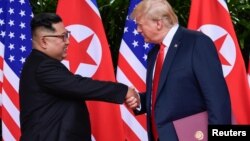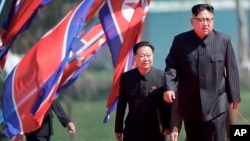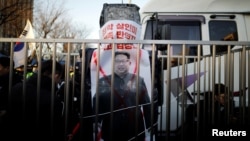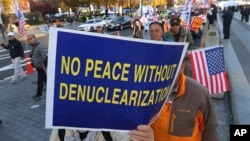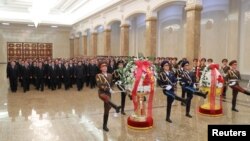North Korea’s human rights record is emerging as the latest issue separating Washington and Pyongyang, as denuclearization talks have stalled.
Often condemned as having one of the worst human rights records in the world — in a 2017 report, the U.S. State Department called the violations “egregious” — North Korea has rejected such criticisms, calling them ploys to overthrow its political system.
President Donald Trump said he raised North Korea’s human rights issue to Kim during the Singapore summit in June and that Kim responded “very well.” But Trump was criticized for failing to obtain a concrete human rights agreement in the joint statement signed by the two leaders at the summit.
US sanctions
The latest tension is triggered by sanctions imposed by the U.S. under the “maximum pressure” campaign designed to push Pyongyang toward denuclearization.
The North Korean Foreign Ministry said that “it will block the path to denuclearization on the Korean Peninsula forever” if the U.S. escalates the human rights campaign against its country and increases sanctions.
The ministry said that it would be the “greatest miscalculation” to think such a campaign would cause it to denuclearize.
The statement issued Sunday came after the U.S. Treasury Department last week blacklisted three top North Korean officials suspected of human rights abuses and censorship, including a top aide to North Korean leader Kim Jong Un.
The sanctions bar the three senior officials from engaging in transactions with anyone in the U.S. and freeze their assets within U.S. jurisdiction.
UN resolution
On Monday, the United Nations General Assembly adopted a resolution condemning North Korea’s “systematic, widespread and gross violation of human rights.”In response, North Korea’s U.N. Ambassador Kim Song said the resolution is “a product of a political plot and hostile forces,” which Pyongyang “categorically rejects.”
A State Department official said the U.S. will continue to bring up North Korea’s human rights issues.
“The president raised North Korea’s human rights record in his summit meeting with Chairman Kim (Jong Un), and will continue to raise this issue going forward,” the official said in an email sent to VOA Korean Service on Monday.
The official added, “(North Korea) is among the most repressive authoritarian states in the world. The United States continues to work with the international community to raise awareness, highlight abuses and violations, promote access to independent information, and keep pressure on (North Korea) to respect human rights.”
Denuclearization talks
North Korea’s warning comes after denuclearization talks between Washington and Pyongyang stalled in early November when North Korea suddenly called off a planned meeting with U.S. Secretary of State Mike Pompeo.
It remains unclear if the human rights issue will derail denuclearization talks.
Ken Gause, director of the International Affairs Group at the Center for Naval Analyses, believes the U.S., by raising North Korea’s human rights record, could disrupt denuclearization talks because Pyongyang sees the issue as undercutting agreements it made with Washington at the Singapore summit in June.
“I think it would be because North Korea sees the agreement at the Singapore summit as one of the agreements — that the objectives, goals that they had — was to improve the U.S.-North Korean relationships, and North Korea sees these actions by the United States undermining that agreement,” Gause said.
John Feffer, director of Foreign Policy in Focus, disagrees. He said the U.S. campaign against North Korea’s human rights violations will not derail denuclearization talks but might “undermine” Trump’s “negotiating position” on the process of denuclearization.
“I don’t think that human rights issues will ultimately derail the talks,” Feffer said. “Ultimately, North Korea is more interested in seeking whether Trump will agree to some kind of mutual process of give and take. That is the major hurdle at this point — the process. The talks will continue to limp along if the process remains murky.”
Robert Manning, a senior fellow at the Atlantic Council, thinks the Trump administration should delink North Korea’s human rights issues from denuclearization talks in the beginning of the negotiation process, because speaking out against North Korea’s human rights violations might divert diplomatic efforts.
“I think it is appropriate for the administration to speak out on the issue,” Manning said. “But not to link it to denuclearization. If the diplomacy advances, and we begin discussions on U.S.-(North Korea) normalizations, human rights has to be discussed as part of that process.”
Improving relations
Despite its sharp retort against U.S. actions toward its alleged human rights abuses, Pyongyang credited Trump’s willingness to improve relations with North Korea, suggesting it is open to talks with him.
A State Department official said the Singapore agreements Trump and Kim made on denuclearization will be fulfilled.
“At the summit in Singapore, President Trump and Chairman Kim made the first leader-level U.S.-(North Korea) commitment on denuclearization in history,” said the official in an email message sent to VOA Korean Service on Sunday.
“We remain confident that the commitments made by President Trump and Chairman Kim at their summit Singapore will be fulfilled.”
Baik Sung-won of VOA’s Korean Service contributed to this report.




